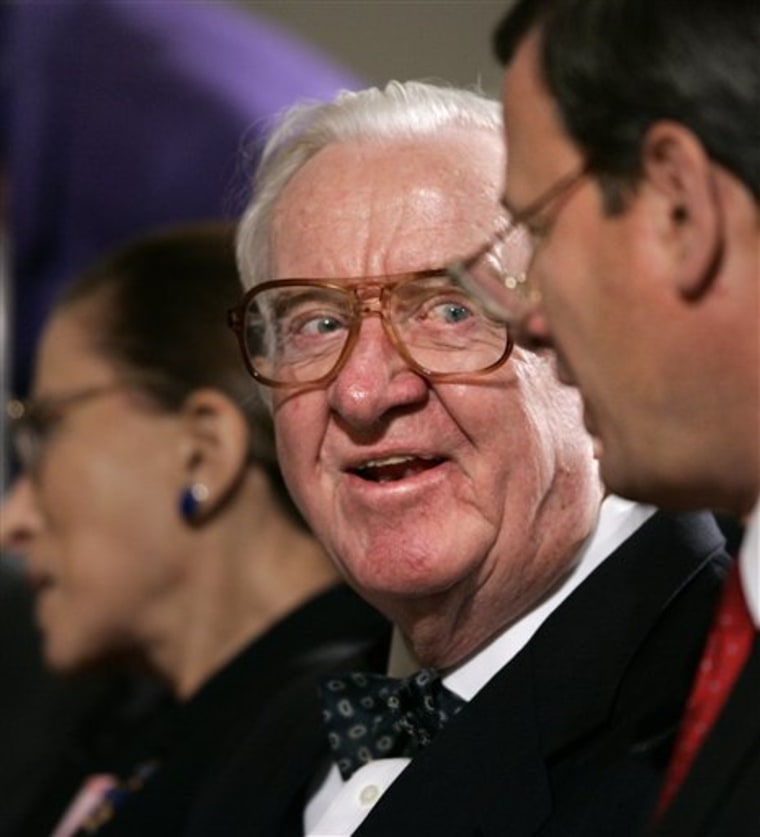Only one Supreme Court justice was at Chicago's Wrigley Field to see Babe Ruth supposedly point to the spot where he would hit a home run in the 1932 World Series.
John Paul Stevens is old enough that he worked for a year at the court as a young man before three of his fellow justices even were born. Stevens doesn't mind calling attention to his age —88 — even though liberal interest groups prayed regularly over the past eight years for his continued good health.
No one thought Stevens would retire from the Supreme Court while George W. Bush was president. But now that Bush's successor has been elected, the only question being asked about the court's oldest and longest-serving justice these days is not can he hang on, but when might he leave.
After nearly 33 years on the court, there is no clear answer.
Seated in a comfortable chair on a stage at the University of Florida recently, Stevens betrayed no sign that he is preparing to retire, remarking only that if the court had maintained the same heavy caseload today it had when he became a justice in 1975, "I would have resigned 10 years ago."
Stevens already has hired the law clerks who would begin work in October 2009, one sign — though not conclusive — that he plans to serve at least until June 2010.
Justices are appointed for life and some in the past have famously pledged to serve out their terms. Chief Justice William Rehnquist was the most recent justice to die in office, in 2005.
Several former law clerks to Stevens have said that he is acutely conscious of not wanting to follow the examples of Rehnquist or Justice William Douglas, whom colleagues had essentially to force to resign in 1975 after a serious stroke. Stevens took Douglas' seat.
"He's responsible enough and selfless enough not to hang on until he's incapable of doing the job," said University of Oklahoma law professor Joseph Thai, a clerk for Stevens in 2000 and 2001. "I've heard he's asked someone on the court to let him know, if he doesn't realize it himself, if he ever gets to that point."
He seems far from it at the moment.
A sharp questioner
Stevens is a sharp, though polite, questioner, and a prolific writer. He regularly commutes between the court and his home in south Florida. There, he works by computer and uses e-mail to stay in touch with his office in Washington. He plays tennis, golf and bridge.
He appears also to take a certain pride in his advanced age; only Oliver Wendell Holmes remained on the court at 88. In a dissent in a case involving a videotaped high-speed car chase, Stevens noted that he alone among the justices learned to drive before the advent of the interstate highway system.
"Had they learned to drive when most high-speed driving took place on two-lane roads rather than on superhighways — when split-second judgments about the risk of passing a slowpoke in the face of oncoming traffic were routine — they might well have reacted to the videotape more dispassionately," he said.
Douglas Kmiec, a Pepperdine University law professor and former Reagan administration official who backed Democrat Barack Obama this year, said that at a recent conference Stevens showed he "is as intellectually able as ever."
In listening to Stevens' recount his presence at the 1932 World Series game known for Ruth's "called shot," Kmiec said, "It was very clear that the justice was very amused to amuse us with his age."
Departing one at a time
If Stevens decides to retire, he will probably consider a variety of personal, institutional and political factors, said Artemus Ward, a Northern Illinois University political science professor who has written a book on Supreme Court retirements.
Justices typically like to depart one at a time, at the end of a term, and not during a presidential election year to keep the court running smoothly, Ward said.
When their health is not an important reason, they tend to "time their departures to coincide with like-minded presidents," he said.
Obama, also a fellow Chicagoan, would seem to be a better match for Stevens than was Bush. As the leader of the court's liberal wing, Stevens helped marshal majorities that questioned important aspects of the Bush administration's preventive detention policy for suspected terrorists.
Stevens also wrote a fierce dissent in Bush v. Gore, the case that helped seal the 2000 presidential election for Republican Bush.
"I think one reason he didn't retire was that he didn't want the legacy of Bush v. Gore to extend to his replacement," Thai said.
